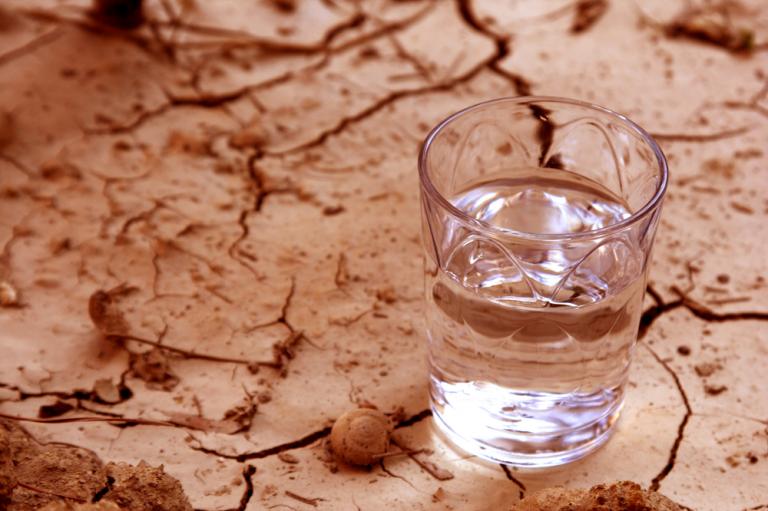By Rabbi Dr. Shmuly Yanklowitz and Susan Barnett.
This year marks the 60th anniversary of one of the most iconic scenes in film history. In the 1956 Academy Award-winning film, The Ten Commandments, the young Charlton Heston parts the Red Sea and the Israelites make their heroic escape from ancient Egypt. During the modern Passover celebration of this Exodus, when the Jews reached the safety of the far shore and the Egyptian armies were drowning in the sea, the rabbinic tradition teaches, “the heavenly hosts broke out into songs in jubilation. God silenced them and said, ‘My creatures are perishing, and you sing in praise?’”
Water takes lives. But water also gives life. Next to Elijah’s Cup at the Seder, the Passover meal, today we also place a second cup filled with water, Miriam’s Cup. Water played a role in Miriam’s life from the first time we meet her, watching over the infant Moses on the River Nile. Jewish mystics believe that Miriam was the spiritual source of water in the desert. The waters of Miriam’s well were said to be healing and sustaining as the Israelites wandered the desert. Miriam’s Cup is a symbol of all that sustains us through our own journeys.
Which is why Miriam’s cup is filled with water, the source of life.
Water is so fundamental to all life that it takes on an almost sacred role in every world religion, where its power to cleanse, bless, and purify are celebrated. From baptism to burial rites, water is the only symbol every faith shares.
But water can also bring about its own bondage.
Today there remains an Angel of Death that’s kept far too busy by water. Water is the #1 cause death of children under five, killing more children than war. Water is responsible for 50 percent of malnutrition in children. Fifty different preventable diseases and illnesses are caused by lack of access to clean drinking water and sanitation.
Without water, food security is impossible; girls’ education is impossible because girls drop out when they don’t have the dignity of sanitation; gender equality is impossible when women spend their days hauling water. Without water, the cycle of poverty, violence against women, and global conflicts are assured.
But what is remarkably simple is the multiplier effect of water. Provide a woman with safe water and a toilet, and educate her on basic hygiene, and we set in motion a cycle where maternal and child health become the priority. Women and girls are no longer beasts of burden, and illness and death are replaced by greater productivity and new economic opportunities that benefit families in a global economy, including our own.
In a world that is desperate for religions and governments to be forces for good, water is a solvable problem and an ideal place to unite. There is no better time than now, with spring’s rain and renewal, to make water the urgent priority it needs to be.
Prioritize. The U.S. government spends just one one-hundredth of a percent of the federal budget on water/sanitation/hygiene development, “WASH.” No matter how much good work is done by the private sector, no funding and leadership is more influential than U.S. government foreign assistance. The U.S. must increase WASH work in all global health and development partnerships because any health and development plan or legislation that doesn’t include WASH is guaranteed to fall short. That’s just smart, logical and cost-effective policy. Let’s make sure our Members of Congress know that!
Avoid the rusty pump. Many American’s enthusiastically commit to installing “the village water pump,” but 50 percent of these one-off projects fail. We’ve got to dramatically ramp up and provide far wider support to what works, not to what makes us feel good.
Grow global citizens. Engage secular and religious schools and youth groups in real life water projects that help students just like themselves.
Save money. Americans lead the world in per person water use. In four days we use more water than the world uses oil in a year. We over-water our lawns, waste food and flush six billion gallons of clean drinking water down the toilet every day. We can be smarter about our water use.
If any of us witnessed a child die for lack of clean water, certainly we’d pay far closer attention to the role water has in life. And God silenced them and said, “My creatures are perishing, and you sing in praise?”
Rabbi Dr. Shmuly Yanklowitz is the Executive Director of the Valley Beit Midrash, the Founder & President of Uri L’Tzedek, the Founder and CEO of The Shamayim V’Aretz Institute and the author of nine books on Jewish ethics. Newsweek named Rav Shmuly one of the top 50 rabbis in America.”
Susan Barnett is a former award-winning network news producer, now a strategic media and communications consultant to nonprofits, working at the nexus of media, faith and social justice. She is founder of Faiths for Safe Water.













